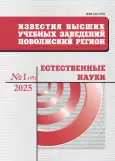Monitoring of landscaping and development of the floodplain area of the Ural River within the boundaries of the city of Orenburg using geoinformation technologies
- Authors: Stepanova I.A.1, Garitskaya M.Y.1
-
Affiliations:
- Orenburg State University
- Issue: No 1 (2025)
- Pages: 78-87
- Section: ECOLOGY
- URL: https://journal-vniispk.ru/2307-9150/article/view/307102
- DOI: https://doi.org/10.21685/2307-9150-2025-1-7
- ID: 307102
Cite item
Full Text
Abstract
Background. Freshwater habitats such as rivers, lakes, streams, and floodplain ecosystems are essential ecological resources that provide many ecosystem functions. The fertile floodplains of the rivers are intensively exploited, as a result of which the landscape along the river valleys is gradually changing as a result of human activity. Materials and methods. The Google Earth Pro application and Landsat satellite images were used tostudy the floodplain area of the Ural River within the city of Orenburg. The QGIS and SAGA GIS programs were used to work with cartographic materials. The digital model corresponding to the maximum flood level is based on data from the digital terrain model FABDEM. Results. The level (height) of the absolute maximum of water during floods has been revealed, on the basis of which the flooding zone of the Ural River near the city of Orenburg isogypsum has been constructed. Based on satellite scenes from Landsat satellites, an analysis of the structure of the floodplain zone within the city for the presence and changes of landscaping and development over the past twenty years has been carried out. Conclusions. When studying the flood activity of the Ural River, the level of the absolute maximum of water was revealed. As a result of studies of the structure of the floodplain zone, there were no changes in the size of landscaping areas and an increase in building areas in this area during the study period.
Keywords
About the authors
Irina A. Stepanova
Orenburg State University
Author for correspondence.
Email: irinaanstp@mail.ru
Candidate of biological sciences, associate professor of the sub-department of ecology and environmental management
13 Pobedy avenue, Orenburg, RussiaMarina Yu. Garitskaya
Orenburg State University
Email: m.garitskaya@yandex.ru
Candidate of biological sciences, associate professor, associate professor of the sub-department of ecology and environmental management
13 Pobedy avenue, Orenburg, RussiaReferences
- Sukhara I. The influence of floods on the structure and functional processes of floodplain ecosystems. Zhurnal pochvennoy i rastitel'noy biologii = Journal of soil and plant biology. 2019;1:44–60. (In Russ.)
- Andreadis K.M., Dzhi Uing O.E., Kolven E. et al. Floodplain urbanization: global changes in imperviousness in flood-prone areas. Pis'ma ob ekologicheskikh issledovaniyakh = Letters on Environmental Research. 2022;17(10):104024. (In Russ.)
- Maddoleni M., Mard Dzh., Ruska M. et al. Floodplains in the anthropocene: a global analysis of the interactions between population, the anthropogenic environment, and flood intensity. Issledovaniya vodnykh resursov = Water resources research. 2021;57(2):e2020WR027744. (In Russ.)
- Chzhen Ts., Vu Z., Chen' I. et al. Research on ecological change and urbanization in coastal zones: a case study in China in the past 20 years. Ekologicheskie indikatory = Ecological indicators. 2020;119:106847. (In Russ.)
- Yakobson R.B., Lindner G., Bitner K. The role of floodplain restoration in flood risk mitigation, Lower Missouri River, USA. Geomorfologicheskie podkhody k kompleksnomu upravleniyu poymami ravninnykh rechnykh sistem v Severnoy Amerike i Evrope = Geomorphological approaches to integrated floodplain management of lowland river systems in North America and Europe. New York: SpringerNewYork, 2015:203–243. (In Russ.)
- Akhilan S., Guan M., Sani A. et al. Impact of restoration of the river on the dynamics of runoff and sediment in the urban river. Zhurnal upravleniya riskami navodneniy = Flood risk management journal. 2018;11:S986–S1001. (In Russ.)
- Ndekhedekhe K.E., Berford M., Styuart-Koster B. et al. Changes in floodplain and freshwater habitat productivity in northern Australia from satellite data (1991– 2019). Ekologicheskie indicatory = Ecological indicators. 2020;114:106320. (In Russ.)
- Roni P., Kholl Dzh. E., Drenner S.M. et al. Monitoring the effectiveness of floodplain habitat restoration: a review of methods and recommendations for future monitoring. Wiley Interdisciplinary Reviews: Water. 2019;6(4):e1355. (In Russ.)
- Tan Z., Li I., Syuy Kh. et al. Mapping flooding dynamics in a heterogeneous floodplain: insights from integrating observations and a model approach. Gidrologicheskiy zhurnal = Hydrological journal. 2019;572:148–159. (In Russ.)
- Vasil'eva T.N., Ivanova E.A., Ryabinina Z.N. Ecological and phytocenotic state of floodplain forests in the vicinity of the city of Orenburg and their recreational use. Izvestiya Nizhnevolzhskogo agrouniversitetskogo kompleksa: nauka i vysshee professional'noe obrazovanie = Proceedings of Lower Volga Agro-University Complex: science and higher professional education. 2024;(3):70–81. (In Russ.)
Supplementary files























